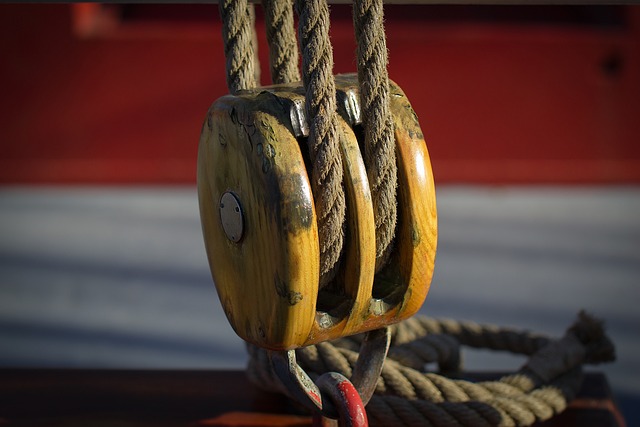Commercial fishing faces significant challenges due to harsh marine environments, with traditional ropes often failing due to salty waters, currents, and UV exposure. UV-resistant marine rope is a game-changer, utilizing specialized materials and coatings to shield against UV rays, ensuring superior durability and longevity at sea. This enhances safety, prevents equipment failures, reduces replacement costs, and offers cost-effectiveness through prolonged use, making it an essential component for safer fishing operations worldwide.
Commercial fishing is a demanding industry, requiring robust equipment to withstand extreme conditions. Understanding the unique challenges faced by fishermen is key to ensuring their safety and productivity. This article explores why UV-Resistant Marine Rope is an essential component for commercial fishing operations. From its ability to resist damaging UV rays to its longevity and cost-effectiveness, high-quality marine rope offers sustainable benefits, enhancing efficiency and reducing risks in this vital sector.
- Understanding the Demanding Nature of Commercial Fishing
- The Role of UV-Resistant Marine Rope
- Key Benefits of Using Quality Marine Rope
- Longevity and Cost-Effectiveness: A Sustainable Choice
Understanding the Demanding Nature of Commercial Fishing
Commercial fishing is a demanding and critical industry that relies heavily on robust and reliable equipment to ensure safe and efficient operations at sea. Fishing vessels often navigate through challenging marine environments, facing constant exposure to harsh weather conditions, salty waters, and varying sea currents. These factors contribute to the rapid deterioration of traditional ropes, posing significant safety risks for crew members and potentially leading to costly equipment failures.
UV-resistant marine rope emerges as a game-changer in this context, offering superior durability and longevity compared to conventional fishing lines. The relentless sun’s ultraviolet (UV) rays can accelerate the breakdown of natural or synthetic fibers used in regular ropes, causing them to weaken and fail prematurely. UV-resistant marine ropes, however, are designed with specialized materials and coatings that shield them from these harmful rays, ensuring they maintain their strength and integrity over extended periods. This feature is vital for commercial fishing vessels, where the last thing fishermen want is a rope failure at a critical moment during their operations.
The Role of UV-Resistant Marine Rope
In the unforgiving marine environment, commercial fishing boats are subjected to prolonged exposure to harsh conditions, including intense sunlight and varying water temperatures. This is where UV-resistant marine rope plays a pivotal role. Traditional ropes can degrade over time due to ultraviolet (UV) radiation from the sun, leading to fraying, breaking, or loss of strength—all of which pose significant safety risks for crews and critical equipment. UV-resistant marine ropes are engineered to withstand these conditions, ensuring their integrity for extended periods.
These specialized ropes incorporate advanced materials and coatings that filter out harmful UV rays, preventing the rapid deterioration associated with regular rope types. By maintaining their strength, flexibility, and overall performance, UV-resistant marine ropes contribute to safer fishing operations, more reliable gear, and potentially reduced costs from frequent replacements. In essence, they are an indispensable component in the arsenal of any commercial fishing vessel navigating the world’s oceans.
Key Benefits of Using Quality Marine Rope
Using high-quality marine rope, specifically designed for maritime environments, offers numerous advantages for commercial fishing operations. One of the most critical benefits is its UV resistance. Marine ropes are exposed to intense sunlight and harsh weather conditions at sea, which can lead to rapid degradation if subpar materials are used. UV-resistant marine rope, however, is treated with specialized coatings or incorporated with stabilizers that protect against ultraviolet radiation, ensuring the rope maintains its strength, flexibility, and durability over an extended period.
This longevity translates into significant cost savings for fishing vessels by reducing the need for frequent rope replacements. Moreover, UV-resistant ropes enhance safety. Regular marine ropes can become brittle and weak after prolonged sun exposure, posing risks to crew members and potentially leading to equipment failures during critical operations. Quality marine rope, designed with UV resistance in mind, maintains its integrity, providing a safer working environment at sea.
Longevity and Cost-Effectiveness: A Sustainable Choice
In the demanding world of commercial fishing, equipment choices can significantly impact productivity and sustainability. One often overlooked yet crucial component is the marine rope. Among various types, UV-resistant marine ropes stand out for their exceptional longevity and cost-effectiveness. These ropes are designed to withstand the harsh marine environment, offering superior durability compared to regular alternatives.
The resilience of UV-resistant marine ropes against ultraviolet (UV) rays from sunlight is a key factor in their longevity. Regular exposure to UV radiation can cause ropes to degrade, becoming brittle and prone to breaking. In contrast, UV-resistant ropes incorporate special additives or coatings that absorb or reflect UV rays, preventing the chain links from weakening over time. This sustainable choice not only reduces the need for frequent rope replacements but also minimizes waste, making it a cost-efficient option for commercial fishermen.
Commercial fishing faces unique challenges, demanding durable equipment like UV-resistant marine rope. Investing in high-quality ropes offers significant advantages, including extended lifespan and cost savings, making it a sustainable choice for fishermen. By prioritizing these specialized ropes, they can enhance their operations’ efficiency and reliability while navigating the harsh marine environment.
